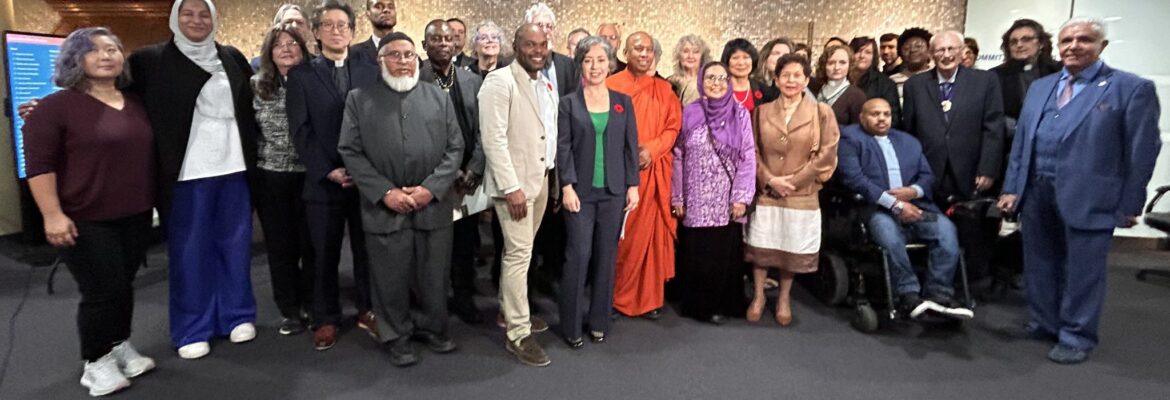
On Nov. 7, Bishop Kevin Robertson joined Toronto faith leaders, Mayor Olivia Chow, Councillor Alejandra Bravo (chair of the Economic & Community Development Committee) and members of city council at City Hall to call for a caring and supportive approach to shelters and homelessness. Below are Bishop Robertson’s remarks from the event.
When asked which of God’s commandments is the greatest, Jesus pointed to the twin obligations of loving God and loving one’s neighbour. And when pressed further as to who is one’s neighbour, he responded with the parable of the Good Samaritan. This parable demonstrates that our neighbours are not only those who are like us, or those whom it is convenient for us to help, but those who need our help the most.
The prophet Isaiah reminds us that true worship is to share food with those who are hungry and to give shelter to those who are homeless. Jesus likewise reminded his followers that meeting the needs of “the least of these” is the same as offering that service to him.
We know that homelessness in Toronto has grown exponentially in recent years, exacerbated by rising housing and food costs, stagnant social assistance rates, and the effects of the COVID-19 pandemic. Even at their current capacity of over 9,500, we know that the city’s existing shelters are bursting at the seams, with hundreds of people seeking shelter daily only to be turned away. We have seen encampments of unhoused people springing up in every part of the city, including in St. James Park right beside our cathedral, as people try to make what shelter they can. I know from visiting our churches in every part of Toronto that all are seeing increasing numbers of people come to their outreach programs, people who are struggling with food insecurity, housing insecurity, and homelessness. This is true from Mimico to Malvern, from Parkdale to Birch Cliff.
These are our neighbours.
These are the people Jesus calls us to love as ourselves, to serve as if we were serving him.
We know that people need not just temporary shelter, but permanent housing. But temporary shelter can be a step toward that permanent housing. The city is working on opening new, smaller-scale shelters in locations where there are gaps in services for people who are experiencing homelessness. We welcome this initiative.
Our Diocese has worked with the city in different ways to address the needs of our unhoused and housing insecure neighbours. Prior to the pandemic, several of our parishes offered overnight shelter through the Out of the Cold program. One of our properties is leased to the city as an overflow warming centre. We’ve worked with the city to reopen St. Hilda’s towers to provide affordable housing for seniors. This is on top of all the parishes that operate food banks, community meals, drop-in space, health clinics, clothing exchanges and other services for those in need. We know the challenges, but also the rewards, of getting to know and serve our most vulnerable neighbours.
As visible homelessness has increased, so have fears of those who experience homelessness, who are already bearing the brunt of social inequities. Some of the same people who object to a homeless encampment in their local park are the first to object when a shelter or affordable housing project opens nearby: they don’t want to have homeless people nearby, but they don’t want to provide shelter or housing, either. Myths and misconceptions abound, such as that unhoused people are more prone to violence, when they are likelier to be the victims of violence than perpetrate it.
Yet we stand for a different way. We reject the demonization of those who have been pushed to the margins of our society. We believe that when we welcome and support those most in need, when we honour their rights and dignity as human beings, our communities become stronger, safer, and more welcoming for all.
Read a news release from Councillor Bravo’s office.